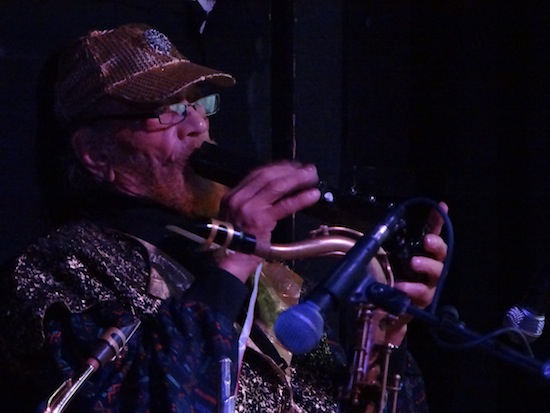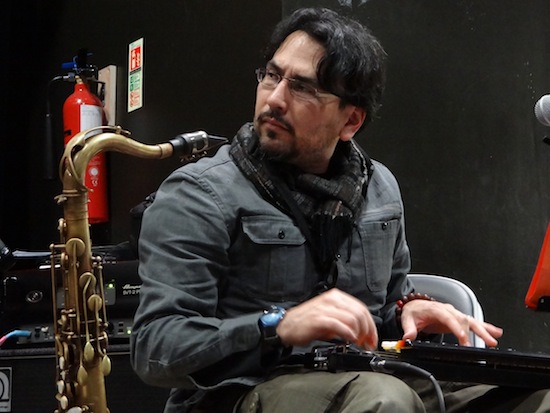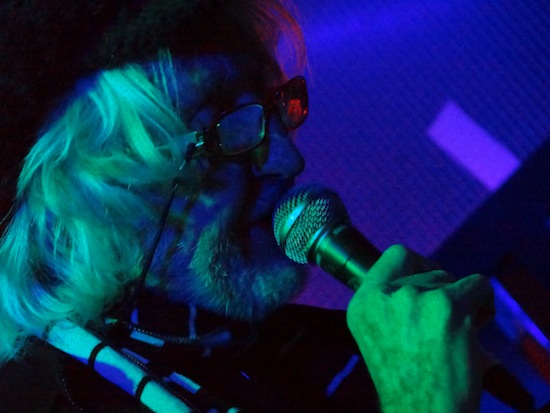I’m at the second night of Marshall Allen’s residency at Cafe Oto and the soon to be 89-year-old Arkestra leader is on form. As James Harrar and I approach him during the intermission of his set with Decoy, Marshall accidentally tips over a scotch that a fan has left for him, so that some of the liquid catches James in the crotch of his pants. He rescues it quickly enough so that not all of the drink is spilled, but it is enough to make James’ (whom it should be noted has only had one small beer over the entire weekend) pants smell like liquor. "What would it be worth?" Marshall inquires slyly, "not to tell folks at home about such misbehaviour?" He continues, laughing: "It was embarrassing, he was all over the place, grabbin’ ass and grabbin’ titties." They both laugh a lot at this. I thought it was pretty funny myself. Marshall downs the last of the scotch and pulls a face. "The last one someone brought was real smooth, but this one…"
It’s the 20th anniversary of the Cinema Soloriens project – a multi-media performance consisting of Harrar’s highly personal cinematic images accompanied by a live musical rendering of soundtracks for each film. Having discovered Sun Ra & His Arkestra via a chance encounter when they aired on Saturday Night Live in the late ’70s, the film maker later met Allen after an Arkestra concert, and the friendship that ensued became the driving force behind an ever-evolving project that has recently seen the two return from a week-long tour of China.
Marshall Allen (born in May of 1924) has been a member of Sun Ra’s Arkestra since 1958 and has led the band since Ra and John Gilmore left the planet in the mid-90s. That he was stationed in France during the Second World War as part of the 92nd Infantry Division, and yet has collaborated with musicians as diverse as Paul Bley and Henry Grimes, Sonic Youth, Caribou and Carl Craig, is testament to the man’s incredible energy and wildly fluid artistic imagination. Marshall, on EVI or electronic valve instrument (a kind of breath operated synthesiser) and alto sax, is joined for the European leg of the tour by Daevid Allen, the creative force behind the incredible psychedelic-jazz band Gong and one-time member of the seminal Soft Machine, and sometime Peter Brotzmann associate (among other things) Rogier Smal.
During the performance, music and image are combined in an attempt to unveil deeper levels of interpretation within the visual poetry of the films.
At James’ prompt, I pose a quick question to them both: "The Cinema Soloriens live experience, as you have said, contains ritualistic or shamanic elements, particularly in its relation to the audience. Do you think that Western cultures have entirely lost their relation to ritual?" (I should clarify here that James and I had previously been talking about ritual in a very loose sense, "ritual as behavioural cut-up," as Burroughs had suggested. Some conscious action performed in metaphorical, abstract sense with a view to generating meaning, as opposed to the movements and deeds of our ‘daily grind’, which so often become completely meaningless by dint of repetition.)
"I agree that it is something that has been somewhat lost, but I think it’s coming back," replies Harrar. "People crave intimacy and you don’t get that from Facebook. I think it’s something that we all still have at an early age. You can see it if you watch children playing, the way they interact and role play. Although sometimes people are also frightened by that intimacy and respond negatively, as has happened on occasion in the past."
Allen grips the lapel of my jacket and pulls me in closer. "A lot of what we want is bad for us. Chocolate cake, hamburger, cigarette. There’s what you want, and what you think you want… and what you need. A lot of people think they know [taps head] but that’s just old information. You wanna be taking notice of what goes on here [taps heart]."
I suggest to him that Descartes has a lot to answer for. Thinking is a tool – an incredible tool – but sometimes we mistake it for being. I think therefore I am – I thought therefore I was, more like.
"You ask me what I think?" he continues. "What I think may be one thing yesterday, another today. Yesterday is gone [taps heart again], Now is different – you got to learn to go with the heart, what you need… some music maybe – music is vibrations, they are everywhere – and not worry too much about what you think you need. It doesn’t matter whether you think you like it or not, if you don’t need it then that’s OK, someone else might. Heart is spirit. Once you are thinking, you put yourself in a box, whereas spirit [makes an upwardly spiraling motion with his index finger] spirals out. You don’t need to read the newspapers to find out what’s going on, that’s just someone else’s opinion," he says emphatically. "They say you and I can’t go to the moon… I say why not?"
He pulls me even closer, fixes me with a kindly yet piercing stare: "You understand what I’m telling you?"
Absolutely, I reply, absolutely 100%. Like Heraclitus said: ‘You can’t step into the same river twice.’
He laughs and shakes my hand with a strong grip, before taking to the stage with Decoy to slay the audience with an incredible second set. With Allen taking point on sax and EVI, the trio of Alexander Hawkins on Hammond B3 organ, Steve Noble on drums and John Edwards on double bass, invoke the spirit of Larry Young’s incredible Lawrence of Newark with additional Arkestral overtones.
The night before, Cinema Soloriens had brought a more surreal yet strangely meditative vibe to the venue. Even at 74, It has to be said that Daevid Allen, who has flown in from Byron Bay in Australia to join the tour, is the sharpest dressed man in the room. Silver-haired in white silken suit-jacket, black trousers with an embossed pattern of skulls crackling across them like static and riotously colourful shoes that look as if they belong in the decorative margins of a Gong album, he is the very image of the psychedelic dandy, and wouldn’t look out of place gracing the pages of a modern fashion magazine. I am surprised to discover that Daevid and Marshall have never met before, so beyond expressing his obvious admiration for the Arkestra, Daevid understandably doesn’t have much comment to make on the project at this stage. When I asked Harrar, later on in the week via email, how things were working out, he had this to say:
"For Daevid, I personally wanted a older, seasoned artist that had a direct connection to Brion Gysin, poetry and a penchant for serious sonic exploration. In [Cinema Soloriens] there are spoken word, chants, and my poetry. I wanted the palette expanded to involve another [person]. He has exceeded expectations in every way. So sensitive to nature, meditation, energy and sound. Also he is such a positive person. A pleasure to be around and a joy to be around and learn from."
Seeing Marshall and Daevid share their first musical dialogue together that night is a thrilling experience. Between them, the two Allens sculpt the air into incredible shapes inferring infinity, with Daevid’s glissando guitar and Marshall’s deep-space EVI electronica complimenting each other perfectly. On the screen in the background, Harrar’s experimental films unfold, recalling both the work of Kenneth Anger and the ritualistic dream-like quality of Sergei Parajanov’s Colour Of Pomegranates.
After the show I spoke to Harrar about the project, its 20th anniversary, their recent visit to China, and working with such legendary musicians, amongst other things.
Could you tell me a bit about the background of the project?
James Harrar: "I was exposed to experimental cinema through Berks Filmmakers, while in college in PA. The first film that had a transformative effect was Kenneth Anger’s Inauguration Of The Pleasure Dome, but every every filmmaker I saw at Berks was a major inspiration: Stan Brakhage, Jack Smith, Jerry Tartaglia, Tom Chomont, Gregory Markopoulos, Robert Beavers, Paul Sharits, Ken Jacobs, Jonas Mekas, Maya Deren, to name but a few. I started to make my own films, first on Super 8, and then 16mm. After college I continued to make films and developed a body of work significant enough to start exhibiting. By the late ’90s, I showed a selection of my work at Museum Of Modern Art, New York, as part of Big As Life – An American History of 8mm Films. That exhibition opened a lot of doors for me. Since then I’ve been fortunate to show my work all over the world. The most recent highpoint was China in March of this year."
You talked about seeing Sun Ra and the Arkestra live on television when you were a child. Can you comment further on the impact it made on you?
JH: "To see grown ups singing about outer space, wearing colourful costumes, complete with dancers, all playing music that was coming from a place of great imagination, was an incredible memory for me. When Sun Ra died in ’92, I made a silent film, For Sun Ra, that was a visual meditation on his music, and I dedicated it to him. I attended a Sun Ra Arkestra performance with John Gilmore as the leader, and after the show I offered to buy Marshall Allen a drink and we started talking. He asked me what I did, I told him about my film making, and about the recent Sun Ra film. He was very interested and wanted me to come by the house and show it to him, which I did.
"While viewing the film, Marshall immediately saw the musical structures within the silent film, and was singing to it and voicing rhythms, even suggesting a particular Sun Ra composition (‘Sleeping Beauty’) that would go perfectly with it. We discussed that he could make a music soundtrack to that film and maybe some others. I can’t say it enough about how privileged I am to spend 20 years on this project I started with Marshall, to be a dedicated student of his and close friends."

I started asking Marshall about his impressions on his first visit to China. He said: "Man, it slayed me. The cold and the smog…"
JH: "We both had a great time in China – but now all the focus on is being cold and poor air. The experience was incredible, it was as if the People’s Republic were anticipating a very intimate and special experience. I think it surpassed the expectations. I never saw such personal reaction, audience wanting to touch you – anything to continue the experience. Playing the orphanage was one of the most satisfying moments for us on the China tour – so much smiling!"
Who foots the bill for the project? Do you receive any arts funding?
JH: "Sometimes. I mean, for China we had the support of the US Embassy, which… you know, gives comfort in the fact that the Embassy is giving credence to the project. That they wanna fund improvised art or experimental cinema… and they have to look at it. It’s not just like they go, ‘Oh yeah’ and just give it money. They really have to scrutinise it, you know, they’re looking at the dollars too. Asking: what is it doing to promote culture in China? And it really opens some doors."
You mentioned playing at an orphanage there, how was that experience?
JH: "It was pure joy, man, they were having so much fun and we were having so much fun, and they just marvelled at Marshall’s age when he’s supposed to be an older gentleman and act a certain way and here we are, sort of having this humorous sort of sound discussion and we’re pushing each other around and squawking with our horns, and I’m sort of playing like I’m scared and he’s yelling at me and I’m yelling back, and then we’re chasing each other around and then we’re singing and dancing. You know, again… it’s an aspect of culture that they don’t really get to see – grown ups acting that way. And to perceive that through a universal language like music as the catalyst for feeling love and being loved, in a setting where… it’s tough living, the conditions they were in were really intense, and a lot of those kids had probably been through abuse as well… They were just smiling from ear to ear."
Can you comment further on the content of the films and the way in which they are put together? How much do you perceive of the influence of experimental cinema in ‘mainstream’ (I use the word very loosely here) cinema?
JH: "With film, I think the language, sometimes meditative quality of images is very familiar language – the duration and emotional impact is where the challenge can be encountered. The instant psychic rapport that is established can be very intense and if one is not open to it, can have an opposite effect – shut down. That seems to happen less now, and in fact the audience attention is usually squarely on the film instead of the musicians, so they are directing themselves to the full experience. I think the mainstream, experimental, visual art, all, everything is influencing each other, birds, trees, and the in between."
Can you give me some idea of the kind of qualities that you look for in the musicians you collaborate with?
JH: "I think the qualities that I look for in musicians are artists that are sincere… I think that they need to have a sense of humour, and getting back to what we were saying about intimacy, I think that they have to be willing to share something… I see it with Rogier, sometimes giving people in the audience instruments to play, or sometimes he’s throwing out cymbals into the audience and Marshall’s the same…"

James Harrar
I think for me that when I’ve seen improv at its best, it’s almost like a model for how human society could be, you know. Allowing people to take the centre stage and then stepping back, listening and reacting to one another freely…
JH: "Yeah… but it doesn’t have to be taken too seriously either… it could be very gentle, it could be very disturbing, it could be a lover’s touch, or it could be a slap across the face… it could be all those things. Initially Marshall took the lead, musically speaking, but eventually he told me, ‘You have to take up an instrument, you need to make music for your own films.’ So I did. I took up a bamboo flute with an alto mouthpiece grafted to it, sort of a bamboo saxophone. I also started playing a Balinese flute. Marshall became my teacher, working with me to develop my voice on these instruments for several years (and still does). Gradually I expanded my sound palette to include tenor saxophone, EVI, kora, koto, clarinet, bulbul tarang and husuli."
Could you please comment on your use of the Tewa chant during the performance?
James Harrar: "Tewa chant is a part of me, my heritage, culture. My mother and I are Tewa. She was raised on the Isleta Pueblo Reservation in New Mexico. Being Native American and possessing a unique cultural identity has had a profound impact on my image making. My films are seeped in ritual, trance, meditation, mythic tales and nature. After a visit to the reservation, my mother brought to my attention that fewer people are speaking the native dialect, which is unwritten. I did research on the Tewa dialect, and found there was almost nothing, save for one text from the 1800s that was a poorly translated Tewa folk tale. We took it upon ourselves, starting with that story, to make an accurate translation. This became incorporated into the Cinema Soloriens performance. I speak in the native dialect, then tell the story in English as the music plays. There is no denying a definite ritual/shamanic element, especially when focusing on the Native American performance aspects within Cinema Soloriens. The words I am reciting have never been uttered outside the reservation. It is pretty powerful material and I certainly feel something very special happening when we launch into it."
Finally, whether you want to call it serendipity, synchronicity or simply coincidence, when did you realise the connection between your Tewa name and Sun Ra’s chosen moniker?
James Harrar: "My Tewa name is ThorrShunn which means rising sun… and sol oriens is Latin for rising sun. It was strange seeing all the sun connections, the multiple Ra’s in my namesake Harrar, etc. I guess it just came up years into this, and was somehow not surprising, just natural."
Marshall Allen brings the Arkestra back to London for a five night residency at Cafe Oto from 23-27 August. Next year marks the centenary of Sun Ra’s birth (1914-1993).


